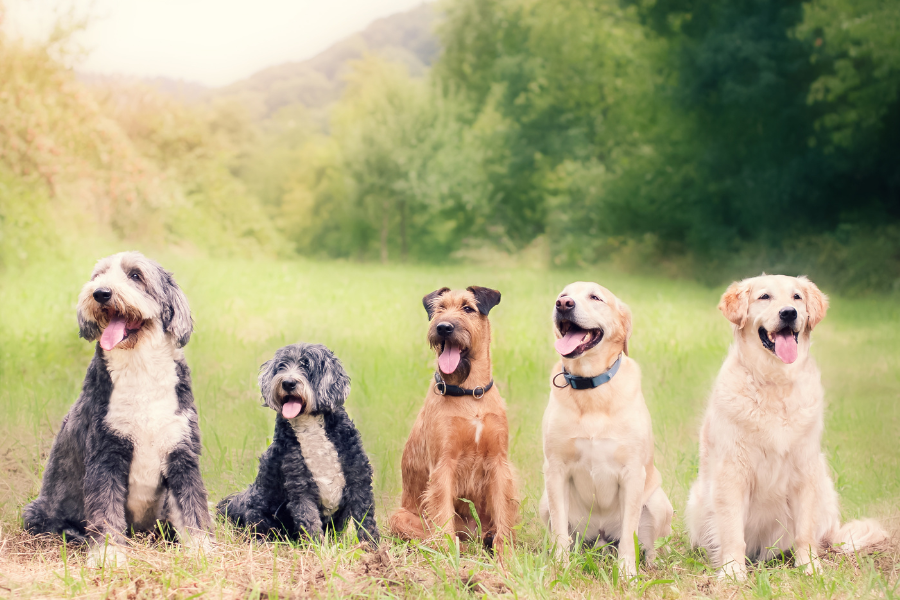As a dog parent, you've probably had a way-too-close encounter or two with your furry buddy's poo. Not exactly the high point of owning a pet, but keeping an eye on your pup's poop can tell you a lot about their health. Working out why your pupper's stool is a bit soft, or wondering what's normal, can be tricky. But don't worry, we've got your back.
We're going to make sense of the reasons why your dog might have soft stool, what you can do to get it back to normal, and when it's time to bring in the professionals.
So, what's "Soft Stool" all about?
Firstly, let's clear up what we mean by "soft stool." It's not as solid or well-formed as what we'd call "healthy" dog poop (yep, there's such a thing). It might look a bit squishy, shapeless, or even a bit watery. Whatever it looks like, it doesn't scoop up easily - super annoying when you're stuck with just one poop bag in the park. (We've all been there, right?)
It’s worth mentioning that soft stool isn't the same as diarrhea. While diarrhea often means a lot of watery poops, soft stool isn't usually as bad and may only happen once or twice to an otherwise healthy dog.
Common Causes of Soft Stool in Dogs
Soft stool can be caused by a variety of factors, from diet to stress and beyond. Here are the most common culprits:
1. Dietary Changes
Changing your dog’s food too quickly can upset their tummy. Whether you’re switching brands or trying a new flavor, a sudden change in diet can lead to soft stool. Dogs need time to adjust to new ingredients. Think of it as their digestive system needing to meet the new kid at school—it takes time to settle in!
2. Eating Something They Shouldn’t
Does your dog enjoy the occasional “snack” from the trash or the yard? Eating things like table scraps, spoiled food, or foreign objects can easily lead to soft stool. Grass, dirt, and any leftovers from your last BBQ might seem like a treat to your dog, but their stomach doesn’t always agree.
3. Food Intolerances or Allergies
Certain food ingredients don’t sit well with some dogs. Grains, dairy, or specific proteins like chicken or beef can trigger digestive issues, including soft stool, for dogs with sensitivities or allergies.
4. Overeating
We know it’s tough to resist those puppy-dog eyes asking for “just one more bite,” but overfeeding can overwhelm your dog’s digestive system. Too much food, no matter how high-quality, can lead to incomplete digestion and—you guessed it—soft stool.
5. Stress and Anxiety
Yes, dogs get stressed too! Big changes, like moving to a new home, introducing a new pet, or having visitors over, can cause digestive upset. Stress affects the body in many ways, including your furry friend’s bathroom habits.
6. Parasites
Internal parasites like worms (roundworms, hookworms, etc.) can throw the digestive system into chaos. These uninvited guests can cause everything from soft stool to more severe symptoms like diarrhea, vomiting, or weight loss.
7. Illness or Infection
Sometimes soft stool can be a sign of something more serious, like a bacterial infection (think Salmonella or E. coli) or an underlying medical condition. Chronic issues, such as inflammatory bowel disease (IBD) or pancreatitis, can also lead to recurring soft stools.
8. Medications
If your dog has recently started taking medication, check with your vet to see if soft stool might be a side effect. antibiotics in particular are known to disrupt the balance of digestive bacteria, leading to temporary digestive issues.
Alright folks, let's get down to the nitty-gritty about your dog's soft stool. No worries though, it's usually nothing a little savvy can't solve. Here's a quick run-down (like your pup's stools, right?!) from trusted vets on how to put the brakes on:
How to Firm Up Soft Stool in Dogs
1) Try Probiotics
If in doubt, probiotics are your besties. Give your dog's gut a little TLC with things like FortiFlora or even unsweetened yogurt (if they're cool with dairy). Your pup's digestion gets a boost and those runny stools get shown the door.
2) Food changes
Switching to new chow? Take it slow. Start off by blending a little of the new stuff with their usual bites, and then over a week or so, shift the balance. No shocking their tummies!
3) Go simple
Try keeping it simple. Serving your fur-baby some boiled chicken or turkey (easy on the seasoning), along with plain white rice does wonders for getting that poo-uation under control. Play it safe with smaller portions until things get solid again.
4) Pumpkins
Guess what? Yes, pumpkin! Who knew, right? But plain canned pumpkin (not the yummy pie filling, sorry pup!) works magic on loose stools. A spoonful of this fiber-packed superfood in their meal, and you're good to go.
5) Agua
Hydrate, hydrate, hydrate! If runny stools have left your pup a bit parched, make sure there's plenty of water. Electrolyte solutions formulated for dogs are ace, especially if there've been multiple episodes of squishy stool.
6) Easy on the portion sizes
Watch the portion sizes. Making sure you're not overdoing the chow is key. Follow the feeding guidance based on your pooch’s size, age, and how much they move and groove.
7) De-worm
Worm woes? Check with your vet to clear any doubts and outline a treatment. Regular deworming is always a win, particularly if your dog's a nature enthusiast.
See any signs of stress in your pooch? Keep things calm and comfy. A little routine, a safe spot, and some calming aids can do wonders to keep the squish at bay.
When to Buzz the Vet
Hey, sometimes it's not a big deal if your fur baby's poop is a bit on the soft side, but there are certain signs you gotta keep an eye out for, and that's when you grab the phone and give your vet a ring. If:
- Your pup's soft poop sticks around for more than a few days
- You spot blood or some icky mucus in the poop
- Your dog's energy level drops, they start throwing up, or they're running a fever
- Your dog's not interested in their food or water anymore
- Or if your four-legged friend is losing weight fast or showing other worrisome symptoms
Yeah, it's time to get professional help. These could be signals that something more serious is going on, and they'll need some medical attention.
Final Takeaways
Dealing with soft stool from your furry friend? It can be a bit of a hassle and sometimes a tad worrying. But don't sweat it, most of the time loose stool in dogs is down to something they've chowed down on that they shouldn't have, or maybe they're just feeling a bit stressed out. Usually, all it takes is a sprinkle of TLC and a dash of patience to fix things up.
If you're still scratching your head, wondering what's causing the messy mess, don't be shy about reaching out to your vet. Because let's be honest, a happy pup equals easy poop scooping for us, sounds like a double win, doesn't it?
So go on, your good boy (or girl) is waiting for that tummy rub. You've totally got this!
FAQs
Q: How long does it typically take for a dog's stool to firm up?
A: The timeline for firming up your dog's stool can vary depending on the underlying cause. In most cases, with proper care and dietary adjustments, you can expect to see improvement within a few days to a week. If the issue persists or worsens, it's best to consult your vet for further guidance.
Q: Can stress cause soft stool in dogs?
A: Yes, stress can indeed contribute to soft stool in dogs. Just like humans, dogs can experience digestive upset when they are stressed or anxious. If you suspect stress to be the cause, try to identify and address the source of stress, provide a calm and secure environment, and consider techniques like pheromone therapy or soothing music to help alleviate anxiety.
Q: Are certain dog breeds more prone to soft stool?
A: While there are no specific breeds that are universally prone to soft stool, individual dogs may have unique sensitivities or dietary needs. Some dogs may be more susceptible to digestive issues due to their breed's genetic predispositions. However, it's important to note that each dog is unique, and their overall health and lifestyle factors play significant roles in their stool consistency.
Q: Should I be concerned if my dog occasionally has soft stool?
A: Occasional episodes of soft stool may not necessarily be cause for immediate concern, as they can be attributed to dietary changes, mild digestive upsets, or temporary factors. However, if soft stool becomes a persistent issue, is accompanied by other concerning symptoms, or if you have any uncertainties, it's always wise to consult your veterinarian to rule out any underlying health conditions.
Remember, as a responsible dog owner, you know your furry friend best. Trust your instincts, monitor their overall well-being, and seek veterinary advice whenever necessary for the health and happiness of your beloved companion.
References
1) Riney Canine Health Center. (n.d.). Diarrhea. Cornell University College of Veterinary Medicine. Retrieved December 6, 2024, from https://www.vet.cornell.edu/departments-centers-and-institutes/riney-canine-health-center/canine-health-information/diarrhea



